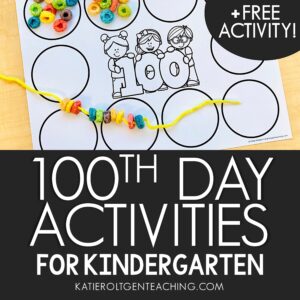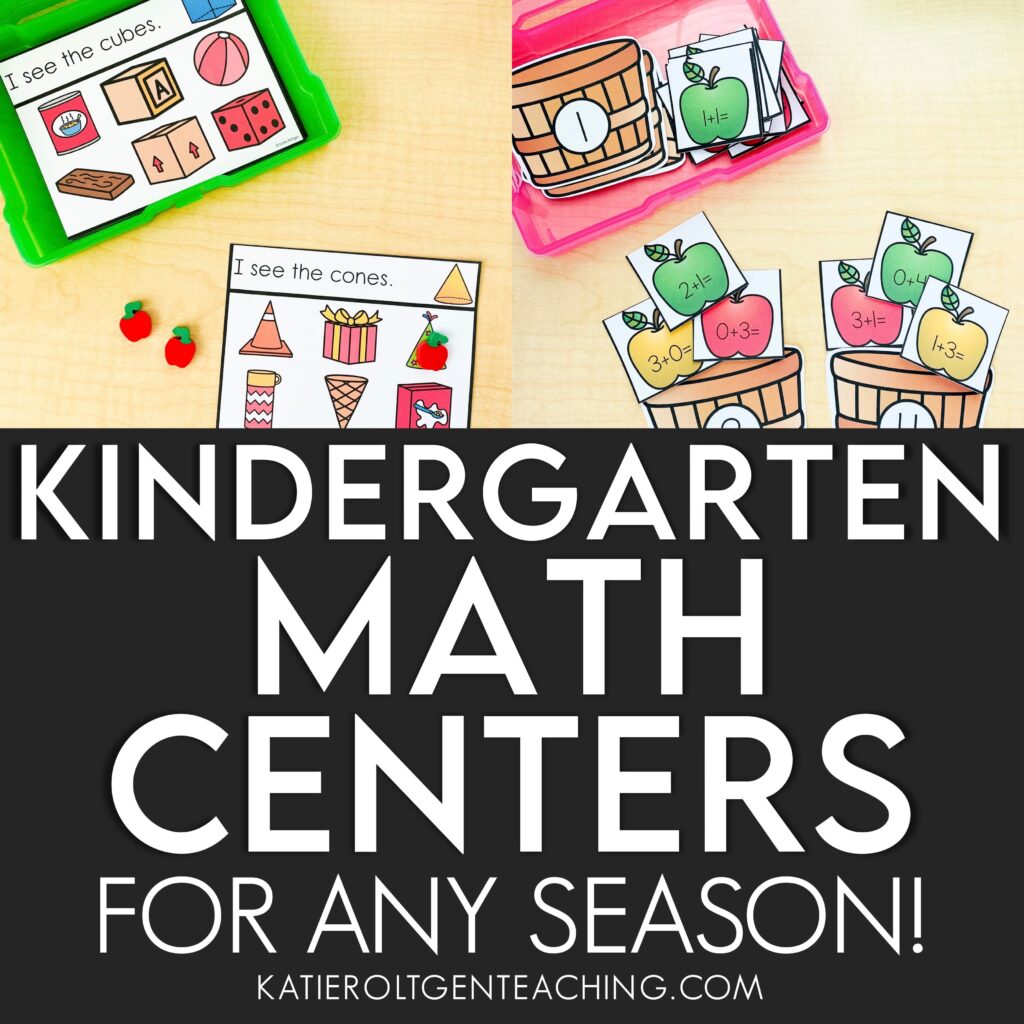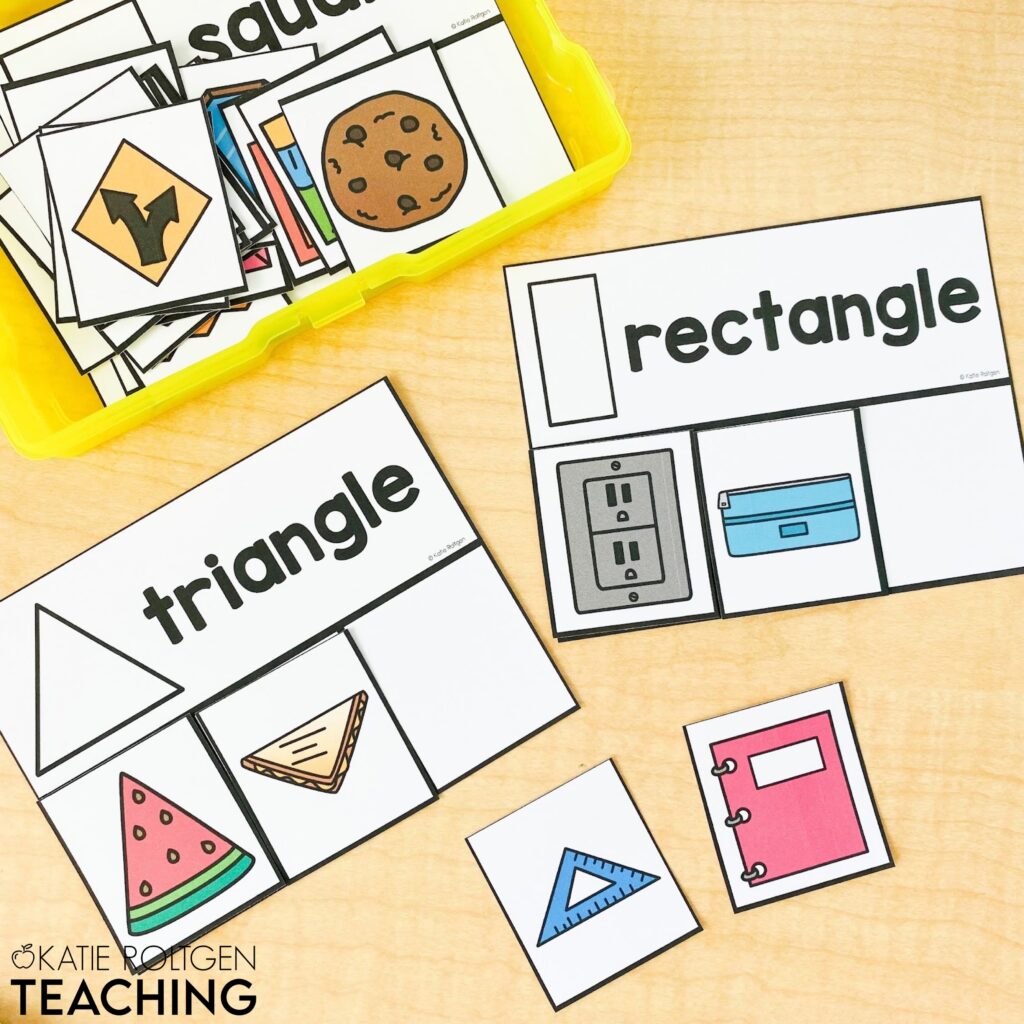
Menu
Let this be your ONE goal for your kindergarten math center activities: make sure your students have fun and are super engaged!
I will tell you that when I was still in the classroom, if we ever had to skip our math stations for the day, my kindergarten students were very upset because they were always part of our daily schedule. (This was bittersweet as you can imagine!)
Math centers in kindergarten are more than just a way to reinforce skills; they’re an opportunity for students to explore, discover, and most importantly, have fun while learning. As teachers, our main goal should always be to ensure that students are not only learning but also thoroughly enjoying the process.
With this in mind, let’s chat about some tips for running effective and engaging math centers in kindergarten (that don’t take tons of prep work on your end!)

This is a question that I get asked a TON! My feeling is that math in kindergarten should totally be about having fun! If it’s not fun for 5 and 6 year olds, guess what? They won’t buy-in to participating in it!
Using engaging and hands-on activities are definitely the key! Try incorporating games, manipulatives and interactive activities into your math centers. This might mean counting with colorful counters, sorting shapes or building numbers with play-doh. Honestly, the possibilities are endless!
Don’t be afraid to get creative and tap into your students’ interests to make math come alive in your classroom.
Running math centers in kindergarten requires careful planning and organization first and foremost. Having a center management system is crucial!
Start by creating designated spaces in your classroom where students can work independently or in small groups. Clearly label the materials and provide visual cues to help students navigate each center.
When introducing a new math center activity, be sure to model the proper procedures and expectations for that particular center so that centers will run smoothly and kids will know exactly what is expected of them.
Keep instructions simple and concise and encourage students to ask for help if needed. I let students choose which math center they wanted to go to each day. My only rule was that they couldn’t do the same center twice that week. This process seemed to work really well.
There are so many diverse goals of using math centers in a kindergarten classroom:
1. Math centers provide opportunities for students to practice and reinforce key math concepts in a hands-on and interactive way.
2. Math centers promote independent practice and problem-solving skills as students work through activities at their own pace.
3. Finally, they allow for differentiation among all of the students in your class, which will help you meet all of their many needs. This way all students are appropriately challenged and supported in their learning with new math concepts.
This answer can definitely vary depending on your class but as a general guideline, I would aim for math center activities to last around 15-20 minutes, allowing for enough time for students to engage with the material without becoming overwhelmed or disinterested.
Consider incorporating timers or visual cues to help students manage their time effectively during math centers. Encourage students to focus on completing tasks to the best of their ability rather than rushing through them.

If you had 80 different math center ideas, would that help you out as a kindergarten teacher?
The Kindergarten Math Centers Bundle includes tons of different center activities for kindergartners like number recognition, number writing, shapes, comparing numbers and sets, basic operations like addition and subtraction, and so much more! These low-prep centers will give you lots of practice over different math activities for the entire year. In addition, they will help strengthen your student’s fine motor skills and number sense skills overall.
These math center activities are not thematic or seasonal in nature and can work all year in any educational setting! They can easily be used by a student during independent center time, but they also work well in math groups, intervention groups, or even as early finisher or morning work activities if you prefer to use them that way!
All of these center activities fit into plastic photo storage boxes, pencil cases/pouches, baggies, plastic bins, etc.
Numbers to 10
Numbers 11-20
Writing Numbers to 10
Writing Numbers 11-20
Number ID to 10
Number ID 11-20
Missing Numbers to 10
Missing Numbers 11-20
2-D Shapes
3-D Shapes
Real-World 2-D Shapes
Real-World 3-D Shapes
Counting by Tens
Comparing Sets to 10
Comparing Numbers to 10
Counting Forward (numbers to 20)
Addition Within 5
Subtraction Within 5
Addition Within 10 with Pictures
Subtraction Within 10 with Pictures
In conclusion, kindergarten math centers play a crucial role in fostering a love for learning and building foundational math skills. By prioritizing fun and engagement, you can create meaningful learning experiences that will benefit your kinders for years to come!
Happy Teaching!